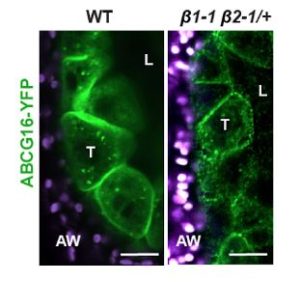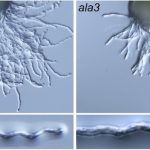The secret sex life of plants: the AP complexes and the building of the pollen cell wall
Liu et al. explore the role of adaptins in plant development.
Chan Liu*1 and Marisa Otegui*2
*1Ministry of Education Key Laboratory of Cell Activities and Stress Adaptations, School of Life Sciences, Lanzhou University, Lanzhou 730000, China
*2Department of Botany and Center for Quantitative Cell Imaging, University of Wisconsin-Madison WI 53706
Background: Adaptor protein (AP) complexes are critical for the recruitment of cargo proteins during vesicle trafficking. AP-1 and AP-2 mediate clathrin-dependent trafficking at the trans-Golgi network (TGN) and the plasma membrane, respectively. Whereas AP-1 regulates trafficking to the plasma membrane (exocytosis) and vacuole, AP-2 mediates endocytosis. These AP complexes consist of four subunits (adaptins): two large subunits (β1 and γ for AP-1, β2 and α for AP-2), a medium subunit μ, and a small subunit σ. The general roles of some AP-1 and AP-2 adaptins in vegetative and reproductive development have been characterized in plants. However, the function of the large β subunits and whether they are shared by the two AP-1 and AP-2 complexes in plants is currently unknown.
Question: Are β adaptins shared by AP-1 and AP-2 complexes in Arabidopsis thaliana? What function do they play in plant development?
 Findings: We found that the two putative Arabidopsis AP1/2β adaptins co-assemble with both AP-1 and AP-2 subunits and regulate exocytosis and endocytosis in root cells, consistent with their dual localization to the TGN and plasma membrane. However, in tapetal cells of developing anthers, AP1/2β adaptins localize almost exclusively to TGN. Mutations in AP1/2β adaptins result in collapsed pollen grains with abnormal walls and reduced pollen germination due to impaired exocytosis of the tapetum-specific plasma membrane transporters ABCG9 and ABCG16, highlighting the essential role of AP1/2β adaptins in plants and their specialized roles in specific cell types.
Findings: We found that the two putative Arabidopsis AP1/2β adaptins co-assemble with both AP-1 and AP-2 subunits and regulate exocytosis and endocytosis in root cells, consistent with their dual localization to the TGN and plasma membrane. However, in tapetal cells of developing anthers, AP1/2β adaptins localize almost exclusively to TGN. Mutations in AP1/2β adaptins result in collapsed pollen grains with abnormal walls and reduced pollen germination due to impaired exocytosis of the tapetum-specific plasma membrane transporters ABCG9 and ABCG16, highlighting the essential role of AP1/2β adaptins in plants and their specialized roles in specific cell types.
Next steps: We will investigate the mechanism by which AP1/2β adaptins recognize cargo proteins and their role in female gametophyte and embryonic development.
Chan Liu, Zhimin Li, Dan Tian, Mei Xu, Jianwei Pan, Haijun Wu, Chao Wang and Marisa S. Otegui. (2022). AP1/2β-mediated exocytosis of tapetum-specific transporters is required for pollen development in Arabidopsis thaliana. https://doi.org/10.1093/plcell/koac192



